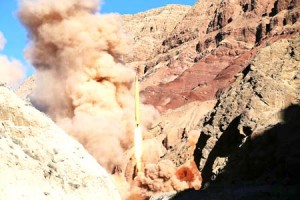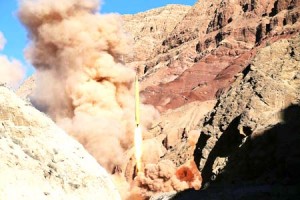New York Times
RICK GLADSTONE
 Iran has infuriated American critics over the past few weeks with missile tests that skeptics say violate a United Nations Security Council resolution and call into question Iran’s commitment to the landmark nuclear agreement that took effect in January.
Iran has infuriated American critics over the past few weeks with missile tests that skeptics say violate a United Nations Security Council resolution and call into question Iran’s commitment to the landmark nuclear agreement that took effect in January.
The critics, including members of Congress from both parties and the Republican presidential candidates, say the Obama administration was naïve in asserting that the nuclear deal would lead to a more amicable atmosphere with Iran after more than three decades of enmity.
Q. Is Iran honoring the agreement?
A. Yes, according to the International Atomic Energy Agency, the nuclear-monitoring arm of the United Nations. The agency reported on Feb. 26, in its first assessment since the deal took effect, that Iran is complying with the terms that are meant to block pathways to a nuclear weapon.
Q. How do we know Iran is not cheating?
A. The agency has a detailed accounting of Iran’s sharply reduced supply of nuclear fuel, working centrifuges and other equipment, and is empowered to monitor them. “The agency’s job is to make sure there is no backsliding,” said Daryl G. Kimball, the executive director of the Arms Control Association, a nonproliferation advocacy group based in Washington.
Q. Are the missile tests prohibited under the nuclear agreement?
A. No. Such launchings are considered a separate issue.
Q. Are critics correct that Iran has violated provisions of a Security Council resolution banning missile launchings?
A. That depends on your interpretation of the resolution, 2231, adopted in July, that put the nuclear agreement into effect. That measure terminated all other resolutions that had penalized Iran for its nuclear program, but it called on the country to refrain from engaging in ballistic missile activity “designed to be capable of delivering nuclear weapons.” Iran contends that the wording does not prohibit launchings and that since it has no nuclear weapons, there is no violation.
Q. What is the Obama administration doing, if anything, about the missile tests?
A. American officials contend that Iran may be in violation of Resolution 2231 and that they may bring a formal complaint to the Security Council, which could lead to new sanctions. Other critics have called Iran’s behavior an ominous sign. “If Iran sees it can violate U.N. missile sanctions with no consequence, it will violate this nuclear deal too,” said Representative Ed Royce, a California Republican who is chairman of the House Foreign Affairs Committee and is a leading skeptic of Iran’s promises.
Q. Iran’s parliamentary elections last month were supposed to have strengthened moderate supporters of President Hassan Rouhani, the architect of the nuclear deal. So why is Iran provoking its critics by testing missiles?
A. The tests have been carried out by the powerful Islamic Revolutionary Guards Corps, which objected to the nuclear agreement as an infringement on Iran’s sovereignty. If nothing else, the launchings demonstrate the Revolutionary Guards are not under Mr. Rouhani’s control.
Q. Regardless of who is carrying them out, how does Iran justify the missile tests?
A. While the United States and its Middle East allies accuse Iran of meddling and being threatening, and of sowing regional instability, Iran says it is a peaceful nation surrounded by hostile powers. The United States Navy’s Fifth Fleet patrols the Persian Gulf. American forces are deployed in Iraq to the east, Afghanistan to the west and in other regional neighbors including Turkey, Bahrain and Qatar. Iran has especially poor relations with Saudi Arabia, its biggest regional rival. And Iran regards Israel, which possesses nuclear weapons, as its most intractable enemy.
Q. When should the United States expect to see tangible benefits from the nuclear deal?
A. Proponents argue the most important benefit — an Iran with no nuclear weapons — is already obvious. Iran remains off limits to most American businesses because many other non-nuclear sanctions still apply. The nuclear agreement did permit a resumption of some types of commerce, most notably sales of civilian aircraft.
Q. What if the next president of the United States wants to abandon or renegotiate the nuclear deal with Iran?
A. The next president theoretically will be free to renounce the deal, but experts in nonproliferation and multinational agreements say the consequences could be onerous for the United States and damaging to its credibility. The nuclear deal also was negotiated by other big powers and has the force of international law because it was approved by the Security Council. Many countries in Europe have since resumed commercial activities with Iran, including purchases of Iranian oil. Any unilateral attempt by the United States to reimpose sanctions on Iran would likely fail because of resistance from American trading partners.
There is no likelihood the Democratic candidates, Hillary Clinton and Senator Bernie Sanders, would repudiate the Iran deal, which both have endorsed. The Republican front-runners, Donald J. Trump and Senator Ted Cruz, have both denounced it, but even they might reconsider their stance.
“Are they really going to pick a fight with a deal that’s working? I don’t think so,” said Cliff Kupchan, chairman of the Eurasia Group, a political risk consultancy in Washington. “When push comes to shove, letting the guillotine fall is something that neither Cruz or Trump would be willing to do.”



